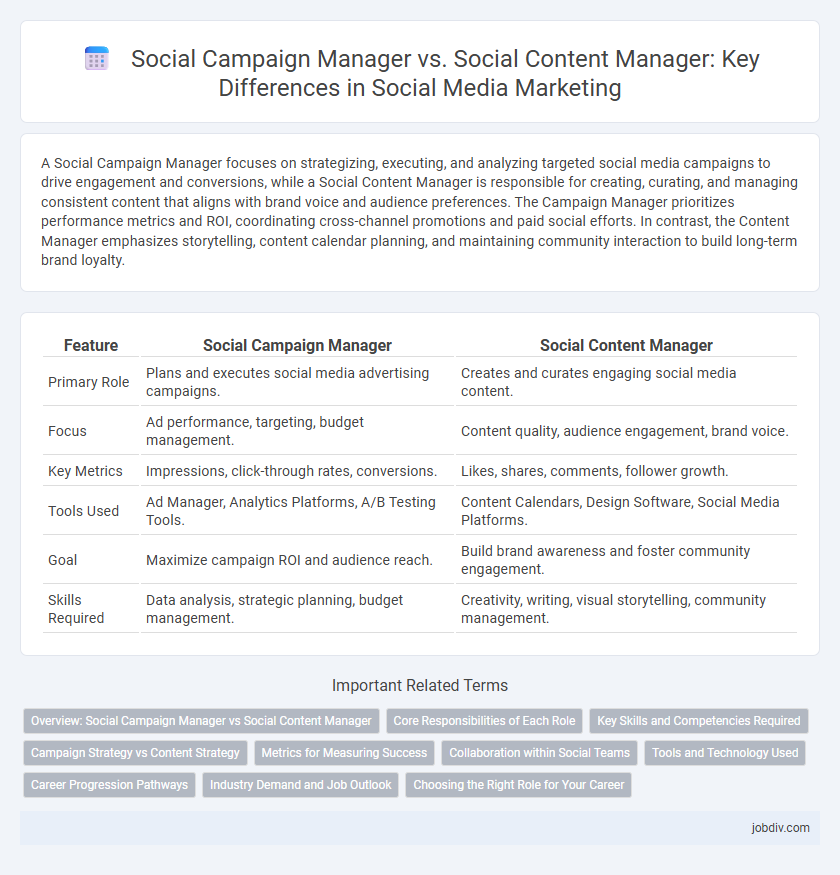A Social Campaign Manager focuses on strategizing, executing, and analyzing targeted social media campaigns to drive engagement and conversions, while a Social Content Manager is responsible for creating, curating, and managing consistent content that aligns with brand voice and audience preferences. The Campaign Manager prioritizes performance metrics and ROI, coordinating cross-channel promotions and paid social efforts. In contrast, the Content Manager emphasizes storytelling, content calendar planning, and maintaining community interaction to build long-term brand loyalty.
Table of Comparison
| Feature | Social Campaign Manager | Social Content Manager |
|---|---|---|
| Primary Role | Plans and executes social media advertising campaigns. | Creates and curates engaging social media content. |
| Focus | Ad performance, targeting, budget management. | Content quality, audience engagement, brand voice. |
| Key Metrics | Impressions, click-through rates, conversions. | Likes, shares, comments, follower growth. |
| Tools Used | Ad Manager, Analytics Platforms, A/B Testing Tools. | Content Calendars, Design Software, Social Media Platforms. |
| Goal | Maximize campaign ROI and audience reach. | Build brand awareness and foster community engagement. |
| Skills Required | Data analysis, strategic planning, budget management. | Creativity, writing, visual storytelling, community management. |
Overview: Social Campaign Manager vs Social Content Manager
A Social Campaign Manager directs targeted advertising strategies across social platforms, optimizing budget allocation and audience segmentation to maximize campaign ROI. In contrast, a Social Content Manager curates, creates, and schedules engaging posts to build brand awareness and maintain consistent voice and messaging. Both roles demand strong analytics skills, but the Campaign Manager prioritizes paid campaign performance while the Content Manager emphasizes organic growth and community engagement.
Core Responsibilities of Each Role
A Social Campaign Manager oversees the strategic planning, execution, and analysis of social media campaigns to drive brand awareness and engagement, focusing on targeting, budgeting, and performance metrics. A Social Content Manager specializes in creating, curating, and scheduling engaging content tailored to the audience, ensuring consistency in brand voice and optimizing content for various social platforms. While the Campaign Manager directs the overall campaign strategy and KPI tracking, the Content Manager concentrates on content production and editorial calendar management.
Key Skills and Competencies Required
Social Campaign Managers excel in strategic planning, data analysis, and budget management, driving targeted ad campaigns and measuring ROI to maximize reach and engagement. Social Content Managers specialize in creative content creation, storytelling, and audience engagement, ensuring consistent brand voice across platforms while optimizing organic reach. Both roles demand strong communication, project management, and adaptability to evolving social media trends.
Campaign Strategy vs Content Strategy
A Social Campaign Manager focuses on developing and executing strategic campaigns that drive specific marketing goals, utilizing data analytics to optimize reach and engagement across multiple platforms. In contrast, a Social Content Manager specializes in creating, curating, and managing content tailored to audience preferences, ensuring brand consistency and storytelling alignment. While campaign strategy emphasizes targeted messaging and performance metrics, content strategy centers on delivering valuable and relevant material to build long-term audience relationships.
Metrics for Measuring Success
Social Campaign Managers prioritize metrics such as click-through rates (CTR), conversion rates, and return on ad spend (ROAS) to evaluate the performance of paid social campaigns. Social Content Managers focus on engagement rates, follower growth, and content reach to measure organic audience interaction and brand awareness. Both roles analyze data through tools like Google Analytics, Facebook Insights, and Hootsuite to optimize strategy and drive social media success.
Collaboration within Social Teams
Social Campaign Managers and Social Content Managers collaborate closely to align campaign goals with creative content strategies, ensuring cohesive brand messaging across platforms. Social Campaign Managers focus on targeting, budgeting, and analytics to optimize campaign reach and performance, while Social Content Managers develop and curate engaging content tailored to audience preferences. This synergy fosters effective teamwork, streamlines workflows, and maximizes the impact of social initiatives.
Tools and Technology Used
Social Campaign Managers primarily use platforms like Facebook Ads Manager, Google Analytics, and Hootsuite to plan, execute, and track multi-channel social media campaigns, leveraging data-driven insights for optimization. Social Content Managers focus on tools such as Canva, Adobe Creative Suite, and content management systems like WordPress to create, schedule, and manage engaging visuals and copy across social platforms. Both roles utilize analytics tools like Sprout Social or Buffer to monitor content performance and audience engagement, but their core toolsets reflect their distinct strategic versus creative responsibilities.
Career Progression Pathways
Social Campaign Managers typically advance by developing expertise in data analytics, paid media strategies, and cross-channel campaign execution, often transitioning into roles such as Digital Marketing Director or Head of Social Strategy. Social Content Managers progress by enhancing skills in content creation, audience engagement, and brand storytelling, leading to positions like Content Director or Chief Content Officer. Both pathways emphasize strategic leadership and specialized knowledge, but Campaign Managers lean towards performance-driven roles while Content Managers focus on creative leadership.
Industry Demand and Job Outlook
Industry demand for Social Campaign Managers is driven by the growing need for targeted advertising and measurable engagement metrics, with job outlooks projecting a 12% growth over the next decade. Social Content Managers experience increasing opportunities due to brands prioritizing authentic storytelling and content consistency across platforms, reflecting a 10% growth rate. Both roles require strong digital marketing expertise, but Campaign Managers emphasize data analysis and ad optimization, while Content Managers focus on creative development and audience engagement.
Choosing the Right Role for Your Career
Choosing between a Social Campaign Manager and a Social Content Manager depends on your career goals and skill set. A Social Campaign Manager focuses on strategizing, executing, and analyzing targeted campaigns to drive engagement and conversions, requiring strong project management and analytics skills. In contrast, a Social Content Manager specializes in creating, curating, and optimizing content to build brand awareness and audience loyalty, emphasizing creativity and content strategy expertise.
Social Campaign Manager vs Social Content Manager Infographic

 jobdiv.com
jobdiv.com